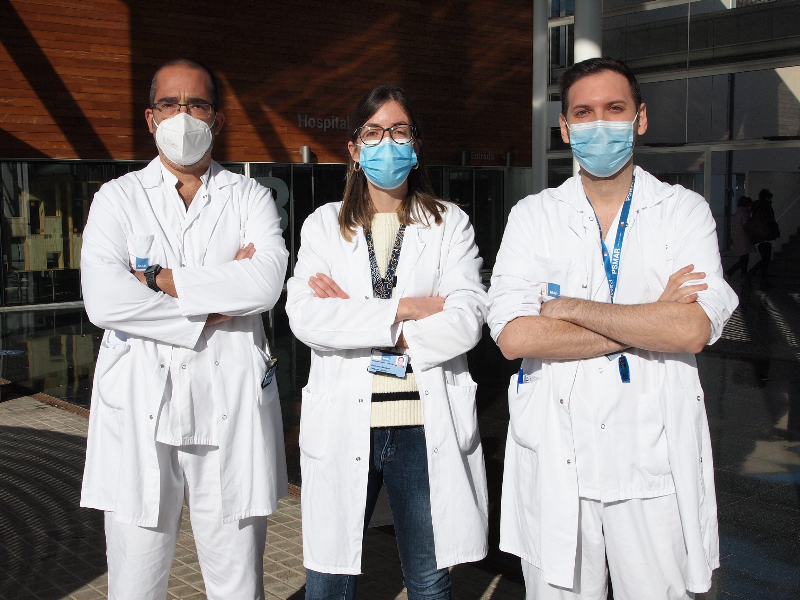
29/12/2021 - Covid-19
Patients with type-2 diabetes affected by COVID-19 are four to five times more likely to die or suffer serious complications from the disease if their blood sugar levels are much higher or much lower than usual
This has been revealed in a study led by the Endocrinology and Nutrition Service at Hospital del Mar and published in the journal Diabetes Care
The ratio of glucose levels on arrival in the emergency room to the patient's usual levels has a high predictive value, more so than either of the two data separately. These levels can be determined easily through a blood test
A patient with type-2 diabetes whose blood sugar levels are very different from their usual ones when admitted to hospital for COVID-19 has a much higher risk of dying, of having to be admitted to the Intensive Care Unit, or needing mechanical ventilation. This has been revealed in a study by doctors from the Endocrinology and Nutrition and Infectious Diseases departments of Hospital del Mar and researchers from the Hospital del Mar Medical Research Institute (IMIM-Hospital del Mar) and the CIBER on Diabetes and Associated Metabolic Diseases (CIBERDEM), which has been published in the journal Diabetes Care. This is the first study to analyse this variable in relation to the prognosis of patients with diabetes infected by the SARS-CoV-2 coronavirus. Diabetes is one of the known risk factors for COVID-19 infection.
Specifically, presenting blood sugar levels 18% lower than expected for the patient increases the risk of death during the hospital stay by almost five times. And while this figure is an average of 22% higher, the chances of dying are actually multiplied by a factor of 4.2. This is not the case for patients whose levels when admitted to hospital are similar to their usual levels.

From left to right: Juan José Chillarón, Gemma Llauradó, Jordi Ramon.
Determining control levels
To reach this conclusion, the study authors analysed data from 91 patients with type 2 diabetes admitted to Hospital del Mar for COVID-19 during the first wave of the pandemic. Their usual glucose levels were calculated by determining glycosylated haemoglobin in blood tests. This test provides information on a patient’s average blood sugar levels over the previous three months. The researchers were able to see that “In patients with admission glucose levels that were much higher than their average, the evolution was worse in terms of mortality, admission to the ICU, and the need for mechanical ventilation. And in cases where blood sugar levels were below the average, mortality also increased”, explained Dr. Juan José Chillarón, head of section in the Endocrinology and Nutrition Service and an IMIM-Hospital del Mar researcher, who points out that “Having glycosylated haemoglobin levels available provides early prognostic information on the patient’s evolution." 31 patients had higher levels and 30 had lower levels.
On the other hand, presenting levels similar to the usual ones at the time of admission had no effect on the prognosis. The authors of the study also found no relationship between blood glucose levels and the likelihood of having a poor outcome from COVID-19. According to Dr. Gemma Llauradó, another author of the study, a consultant in the Endocrinology and Nutrition Service, and an IMIM-Hospital del Mar and CIBERDEM researcher, this means“Putting the patients’ glucose levels in context in order to assess them and monitor them more closely, bearing in mind that they are higher-risk patients."
In this sense, as Dr. Llauradó points out, “In a patient with type-2 diabetes who is suffering COVID-19, it is not enough to focus only on their status when they come into the emergency room, the information must be evaluated according to the degree of chronic control." For that reason, taking these results into account, “It would be interesting if all patients with this type of diabetes who are admitted to hospital with COVID-19 underwent a glycosylated haemoglobin test, in addition to the glucose level measurement carried out when they enter the emergency department, so that we could assess it in the appropriate context”, she says. Of the 91 patients analysed, 19 died from COVID-19. Of these, eight had higher glucose levels than usual and nine had lower levels. Only two cases presented no significant variation in their blood sugar levels.
Reference article
Ramon J, Llauradó G, Güerri R, Climent E, Ballesta S, Benaiges D, López-Montesinos I, Navarro H, Fernández N, Carrera MJ, Mauricio D, Flores-Le Roux JA, Chillarón JJ. Acute-to-Chronic Glycemic Ratio as a Predictor of COVID-19 Severity and Mortality. Diabetes Care. 2021 Nov 15:dc211321. doi: 10.2337/dc21-1321. Epub ahead of print. PMID: 34782352.
© Institut Hospital del Mar
d'Investigacions MèdiquesLegal Notice and Privacy Policy | Cookie Policy | Site Index | Accessibility | Find Us | Contact